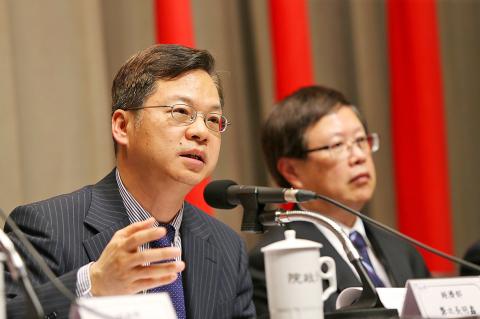Premier William Lai (賴清德) yesterday ordered the government to hasten its efforts to reach agreements with the US in response to the US’ planned tax reform, which could boost exports and help Taiwanese businesses reduce their reliance on China by relocating their investments to the US.
The US’ Tax Cuts and Jobs Act signed into law last year introduces reduced tax rates for businesses and individuals in a bid to spur economic growth, with its effects expected to be felt internationally.
However, the reform plan is forecast to have limited influence on Taiwan’s economy, a National Development Council analysis showed.

Photo: CNA
The tax cuts are expected to increase personal disposable income and spur domestic consumption in the US, which would stimulate Taiwan’s exports to the US in the short term, but whether it would turn into long-term export growth remains to be seen, the council said.
For every 1 percentage point growth of the US economy, there is a 0.15 percentage point increase in Taiwan’s exports and a 0.07 percentage point of growth of Taiwan’s economy, the council said.
The tax reform plan could influence the global strategy of large-scale Taiwanese businesses, prompting them to set up manufacturing bases in the US, but the policy’s affect on small and medium-sized enterprises would be limited, it added.
Taiwanese manufacturers, with a high-degree of automation, can adjust to the highest workforce costs in the US, the council said.
Major conglomerates such as Hon Hai Precision Industry Co, known as Foxconn Technology Group outside Taiwan, and Formosa Petrochemical Corp have announced large investment plans in the US in response to the tax reduction, the council said.
The US is Taiwan’s seventh-largest foreign investor, and most US businesses investing in Taiwan, such as Costco and Applied Materials, are tapping into the domestic market or supply chains, so they are not expected to withdraw from Taiwan back to the US, the council said.
The tax reform plan, coupled with a trade war between Washington and Beijing, could see Taiwanese businesses relocate from China to the US, Southeast Asian nations or back to Taiwan, thereby reducing Taiwan’s reliance on China, the council said.
Lai ordered the Cabinet to increase efforts to reach bilateral tax agreements with the US to eliminate trade barriers, such as double taxation, while increasing the mobility of personnel, capital, technology and merchandise.
Improvements have to be made to advance Taiwan’s investment environment amid a possible surge of international companies relocating to the US, Lai said.
To improve Taiwan’s competitiveness, a stable supply of electricity, water, land and skilled workers has to be maintained, while restrictions on financial laws have to be lifted to encourage private-sector investment, the council said.

ENTERTAINERS IN CHINA: Taiwanese generally back the government being firm on infiltration and ‘united front’ work,’ the Asia-Pacific Elite Interchange Association said Most people support the government probing Taiwanese entertainers for allegedly “amplifying” the Chinese Communist Party’s propaganda, a survey conducted by the Asia-Pacific Elite Interchange Association showed on Friday. Public support stood at 56.4 percent for action by the Mainland Affairs Council and the Ministry of Culture to enhance scrutiny on Taiwanese performers and artists who have developed careers in China while allegedly adhering to the narrative of Beijing’s propaganda that denigrates or harms Taiwanese sovereignty, the poll showed. Thirty-three percent did not support the action, it showed. The poll showed that 51.5 percent of respondents supported the government’s investigation into Taiwanese who have

South Korean K-pop girl group Blackpink are to make Kaohsiung the first stop on their Asia tour when they perform at Kaohsiung National Stadium on Oct. 18 and 19, the event organizer said yesterday. The upcoming performances will also make Blackpink the first girl group ever to perform twice at the stadium. It will be the group’s third visit to Taiwan to stage a concert. The last time Blackpink held a concert in the city was in March 2023. Their first concert in Taiwan was on March 3, 2019, at NTSU Arena (Linkou Arena). The group’s 2022-2023 “Born Pink” tour set a

A Philippine official has denied allegations of mistreatment of crew members during Philippine authorities’ boarding of a Taiwanese fishing vessel on Monday. Philippine Bureau of Fisheries and Aquatic Resources (BFAR) spokesman Nazario Briguera on Friday said that BFAR law enforcement officers “observed the proper boarding protocols” when they boarded the Taiwanese vessel Sheng Yu Feng (昇漁豐號) and towed it to Basco Port in the Philippines. Briguera’s comments came a day after the Taiwanese captain of the Sheng Yu Feng, Chen Tsung-tun (陳宗頓), held a news conference in Pingtung County and accused the Philippine authorities of mistreatment during the boarding of

88.2 PERCENT INCREASE: The variants driving the current outbreak are not causing more severe symptoms, but are ‘more contagious’ than previous variants, an expert said Number of COVID-19 cases in the nation is surging, with the Centers for Disease Control (CDC) describing the ongoing wave of infections as “rapid and intense,” and projecting that the outbreak would continue through the end of July. A total of 19,097 outpatient and emergency visits related to COVID-19 were reported from May 11 to Saturday last week, an 88.2 percent increase from the previous week’s 10,149 visits, CDC data showed. The nearly 90 percent surge in case numbers also marks the sixth consecutive weekly increase, although the total remains below the 23,778 recorded during the same period last year,